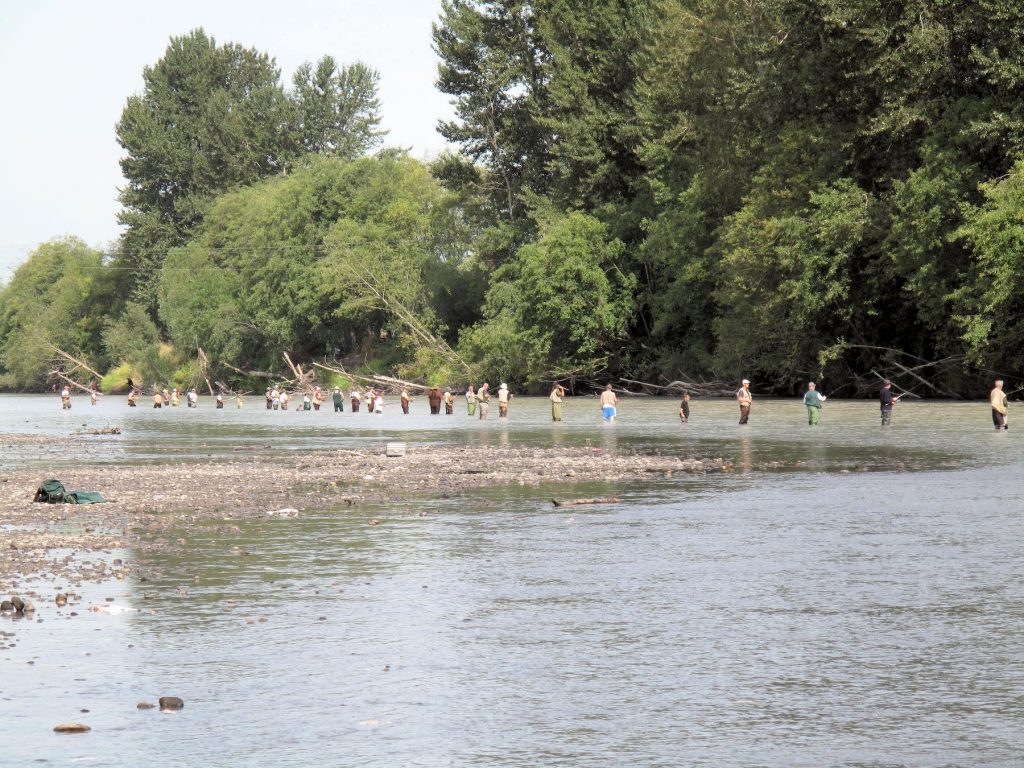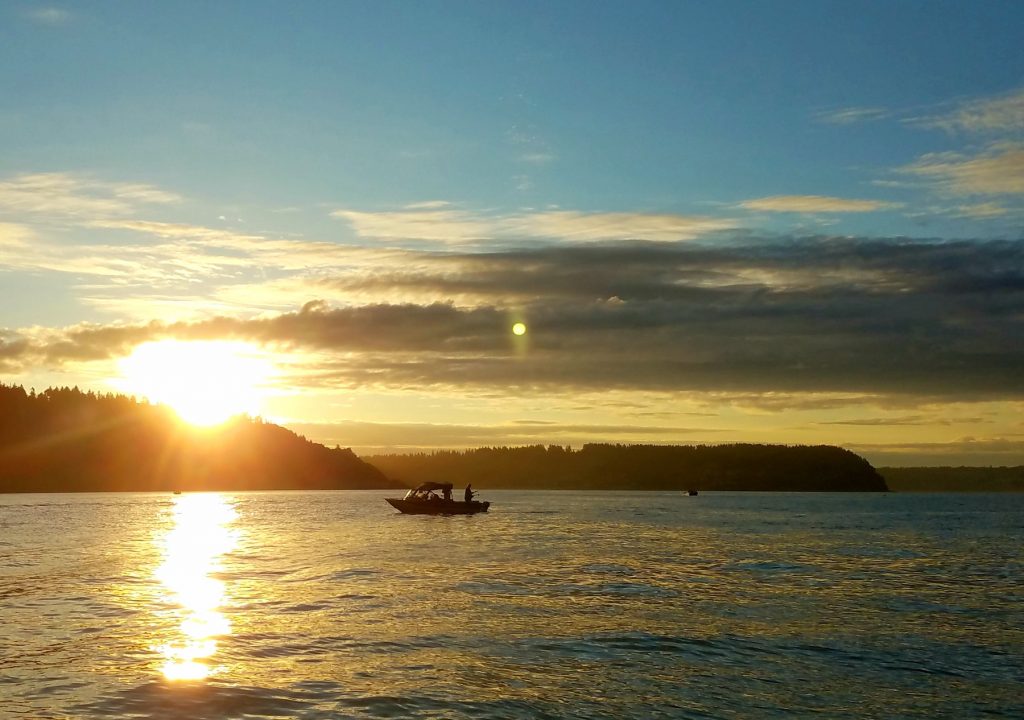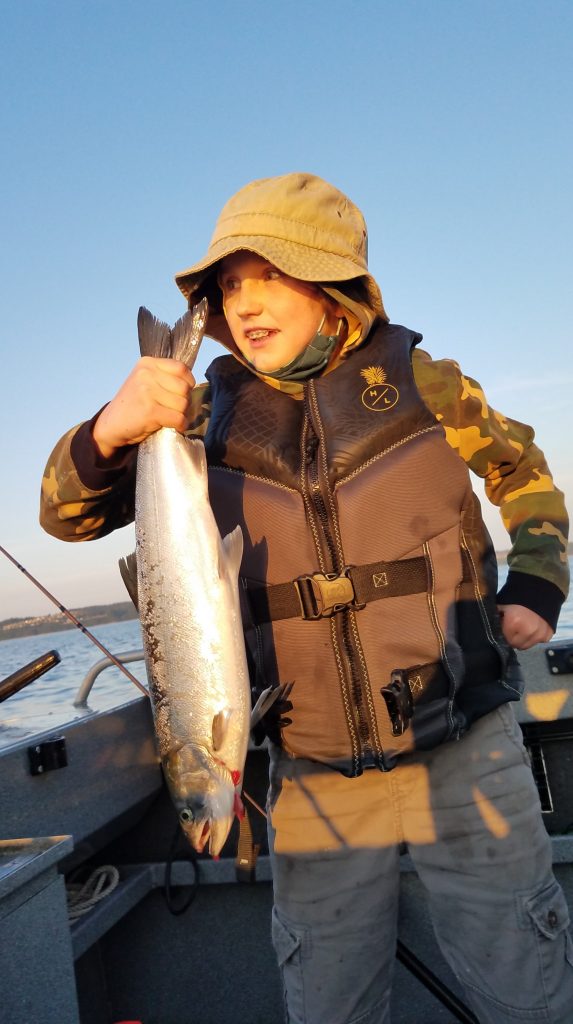
Fish Group Files For Preliminary Injunction On Sound Salmon Fisheries
An Anacortes-based fishing organization has filed a motion for a preliminary injunction on fishing for Puget Sound Chinook and other salmon species.

It’s the latest US District Court move by Fish Northwest, which last Wednesday requested that a federal judge in Seattle hold oral arguments asap because “this matter is time sensitive” as the National Marine Fisheries Service-approved fisheries it “seeks to enjoin occur, in large part, in August and September.”
“Because this involves an ESA violation, all Puget Sound salmon fishing, both tribal and non-tribal will be affected by the injunction,” Fish Northwest stated on a weekend post on its Facebook page.
If the judge were to agree, it could impact Chinook and coho fisheries in South Sound waters and rivers, upcoming Central and North Sound opportunities for salt- and freshwater humpies and silvers, plus fall commercial and recreational chum fisheries.
“The economic injury in this case will be real,” Fish Northwest’s 25-page motion also acknowledged, “but so too is the economic injury of the ever dwindling numbers of Puget Sound Chinook salmon. Billions of dollars are being spent on habitat restoration, and those gains are being wiped out by overharvest and ignoring hatchery influence.”
The argument from the group headed up by charter owner/skipper Brett Rosson is, in a layman’s reading, that the federal biological opinion authorizing 2021-22 state and tribal fisheries over Endangered Species Act-listed Chinook allows numerous rivers’ king stocks to be harvested beyond what is known as their rebuilding exploitation rate, or RER, threatening the runs’ existence, and so an injunction is needed to prevent irreparable harm.
Though the motion from attorneys Joe Frawley and Joel Matteson is somewhat vague in regards to how exactly this season’s harvest rates are expected to exceed 41 percent of RER on the Skokomish, 36 percent on the Nisqually, 35 percent on the Puyallup and 222 percent on the Duwamish-Green River, on social media Fish Northwest points to tribal gillnetting in terminal zones.
“We believe that the future of recreational fishing opportunities depends on the conservation and recovery of wild salmon along with the science-based production and harvest of hatchery fish,” Rosson stated on the organization’s website. “This can only happen if the overharvest of wild fish is stopped and the use of selective fishing methods to harvest hatchery fish is employed.”

Local recreational salmon angling leaders have expressed a mix of very deep concern, confusion and support to this reporter over Fish Northwest’s moves.
Some note the preliminary injunction request only came after Chinook fishing occurred in the waters off of Anacortes, where anglers crushed the relatively small quota in seven days. The biop allowing that and the rest of 2021-22’s seasons was approved back in mid-May, so why not file earlier? It’s not just South Sound rivers exceeding RER, but North Sound, Straits and Hood Canal ones too.
One source, perhaps tongue in cheek, wondered if it was actually the perennially lawsuit-happy and anti-fishing Wild Fish Conservancy that had filed for the injunction.
But another said Fish Northwest is taking the legal action long mulled in some corners of the sport fishing world but never followed through on, and they consider the org to be the “last, best hope” for holding WDFW’s feet to the fire on protecting mark-selective salmon fisheries.
The spark has been North Sound anglers’ particularly keen frustration with the sharp reduction of Chinook fisheries in the San Juans.
“In seven years, we’ve lost 99 percent of our fishing. And nowhere near all of that is attributable to conservation. A lot of that is politics,” Rosson told the website Law360 last week. “The tribes are playing politics, the state is playing politics, and recreational fishermen are paying the price.”
Fish Northwest’s sense is that Stillaguamish hatchery king issues are being used by the comanagers as a “lever” to achieve those reductions. And they believe that WDFW, without its own fisheries permit and dependent on the tribal federal nexus to achieve fast-tracked ESA coverage for state seasons, is being forced to agree to more and more austere fishery measures than are actually federally required for Stilly Chinook.
Their motion for a preliminary injunction on Puget Sound salmon seasons might be seen as a bare-knuckle response to those reductions and catch disparities, as well as an attempt to change the tribes’ preferred way to exercise their treaty-reserved fishing rights.
Who knows what sort of king-hell response that might bring from the tribes, but it’s assured sport anglers, guides, charters and tackle businesses would get a near-term collateral battering if the motion was granted.

Fish Northwest has been active in federal court over the last year.
Last October they filed a lawsuit asking to be allowed to intervene in the Boldt Decision to boost sub-50-50 shares of Chinook and coho for sport anglers, and in late April sued NMFS, USFWS, BIA and WDFW over alleged ESA violations related to this year’s salmon-season-setting process.
Out of the latter, the organization claimed that with this season’s federal biop it essentially got NMFS to confirm that single-year federal fishing permits are indeed available to WDFW.
WDFW issued a “fact sheet” that maintains it plans to continue working with the tribes on salmon fishery plans; NMFS wouldn’t comment.
As for their biop and those RERs, NMFS does acknowledge “greater uncertainty” due to individual river harvest rates being exceeded.
But the feds also state, “The risks associated with exceeding the RER in the 2021 fishing year should not impede achievement of viability by the Nisqually, Puyallup or Green” Chinook runs, and pointing to pending changes in the Skokomish, they say “implementation of the proposed 2021 fisheries will meet the recovery plan guidance by not impeding the viability of” the return.
NMFS says it looked at many other factors and the Puget Sound Chinook population as a whole in concluding that this season’s fisheries wouldn’t jeopardize the listed stock.
If a chance to hear oral arguments is granted, it will be up to a judge to determine if that is so, refute it – or provide some off-ramp. ESA v. Treaty Fishing Rights could have huge implications.
Fish Northwest says it expects to make its case in August’s second or third week.


